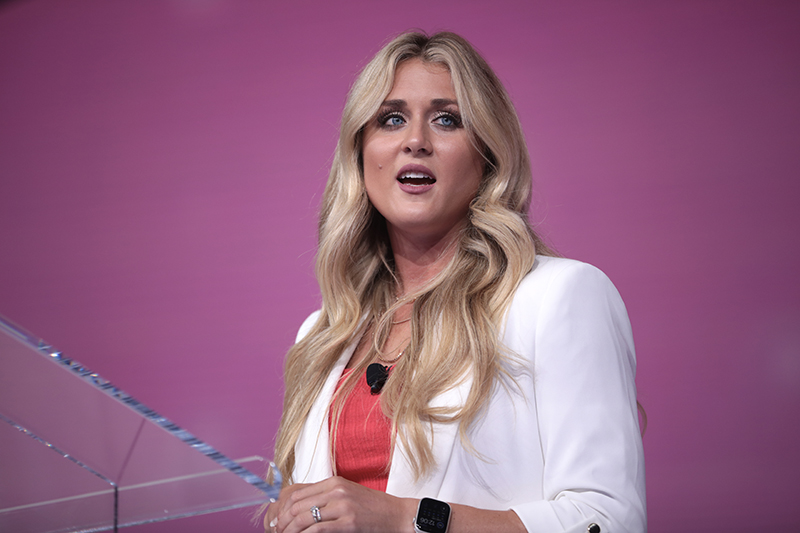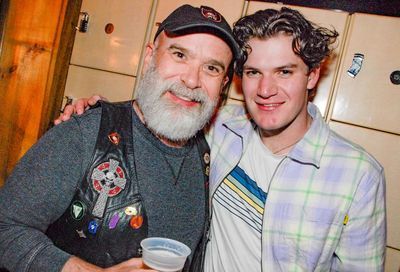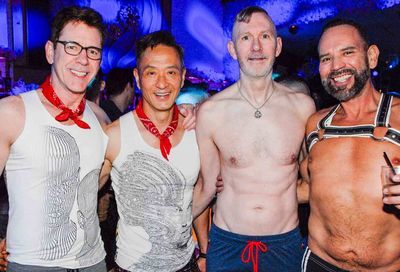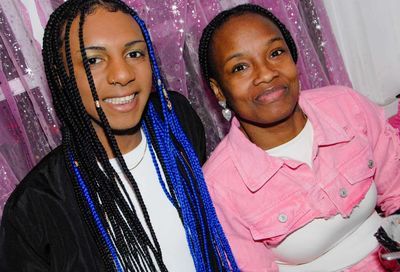Veteran Activist
As the new head of OutServe-SLDN, Allyson Robinson is opening new fronts in the fight for full equality in the military
MW: What was your reaction when you found out that you were going to be taking over in this role?
ROBINSON: I was absolutely thrilled because I very quickly went from this place of, ”Yeah, maybe I’ll give this a shot, because whatever happens I’ll get something out of it. It’s a win for me whether I move forward or not.”
But you don’t go into a process like that without, No. 1, doing some serious soul searching, introspection; and, No. 2, some serious research about the organization, its history, its reputation, where its strong, where its weak.
And as I went through that process it very quickly became clear to me that this was exactly where I wanted to be and exactly where I needed to be. It very quickly seemed to me like something that made the most of all these really weird, great experiences that I’ve had over the course of my life.
And that I’m very, very passionate about. You can hear it in my voice when I talk about my dad’s experience, and my own experience in uniform. It’s like a family. I’d never really expected to have the opportunity to come back and to serve with my family and to serve these soldiers, sailors, airmen, Marines, Coast Guardsmen, that I’ve always looked up to and cared so deeply about.
MW: What sort of message do you think it sends being a trans woman taking over this very big organization?
ROBINSON: You know, I’ve been asked by lots of people, ”How does it feel to make history?” And I’ve got to confess I love what Tammy Baldwin tweeted right after her election: ”I didn’t run to make history. I ran to make a difference.” I think that’s beautiful and I wholeheartedly agree. I wish I had thought of it.
What I love most is being apart of an organization that really lives up to its values. Both of these organizations prior to the merge had full inclusion as one of the hallmarks of their organizational values. That’s not changed on this side of the merger. But it’s one thing to say that you’re inclusive, it’s another thing entirely to prove it, to show it in everything that you do, every day. I think it says something about this organization – not that they would choose a transgender woman to lead, but that they would choose the person who is most qualified to lead, regardless of what that person’s gender identity is.
MW: How did your wife and children react to you being offered the position?
ROBINSON: [Laughs.] I laugh just because I’m measuring in my own head how much I want to tell you here. My oldest — Truman, who’s 13 — when I told him that I was interviewing, I had to travel for the interview so I was explaining why I was going to be gone for a couple of days. He became very quiet, and he’s not the quiet type. I knew he was processing something, I wasn’t sure what, but as we went about the course of the day and I had the opportunity to ask a couple of moments later I realized he had tears in his eyes. I said, ”Son, what’s the matter?” And Truman said, ”But I love HRC.” And I said, ”I do, too. That’s been part of our lives and part of our family. But just as that work that I did there was important, this is really important stuff with really great people. And I think you’re really going to love this, too.”
So they’ve been excited. I think they’ve been very excited that they didn’t have to move. That was a good thing for them. And I’ve gotten to do a couple of interesting, kind of fun, crazy stuff you get to do when you’re an e.d. I got to meet Michelle Obama a little while ago, and go to meetings at the White House or on the Hill. They think I’m such a big deal. They don’t know what the truth is, but I’m good with that.
MW: Going into this new position, what are some of your goals?
ROBINSON: The overarching goal, it’s the same goal that my father was so passionate about as a sergeant. It’s the same goal I was taught being prepared for leadership at West Point, and that I practiced as a commander in the field. It’s taking care of troops.
I think many have felt as though with the repeal of ”Don’t Ask, Don’t Tell,” LGBT people, our community in the military, are taken care of. We did it. Let’s celebrate. And we did do something amazing, worthy of celebration.
I’m shocked, though, to find out as I talk to people and do this work how many don’t realize, for example, that though ”Don’t Ask, Don’t Tell” has been repealed, there are no nondiscrimination protections for sexual orientation, much less for gender identity, in the military. Although LGB troops can be out, they’re anything but equal. DOMA prevents legally married same-sex couples from receiving even the most rudimentary support from the military, things that opposite-sex families take for granted every day. You think of things like health care, health insurance, access to base housing. We think of those things as being kind of small things, but they’re huge things. They’re such big things that they have an impact, a very real impact — this inequality does — on our national security.
Military leaders know how important it is to treat their subordinates with complete impartiality. It’s one of the hallmarks of good leadership. And our leaders are prevented by law from doing that today. They know – we all know – that that has an adverse impact on the ability of units to perform a mission.
So, [one goal is] advocating for equality, seeing that the benefits that can be put into place now, even with DOMA still in existence, are brought into place. There’s a lot of benefits that could be. The service chiefs know that, they’ve studied it, they’ve analyzed it, and they’ve made a decision not to do it, which to me as a military leader equates to a decision not to take care of the troops. I’m going to ask them why. I want to know why.
MW: You mentioned people have this impression that now that ”Don’t Ask, Don’t Tell” has been repealed, this is over. How do you go about bringing people’s focus back to these issues that still have to be tackled?
ROBINSON: You preach it. You use every opportunity to do that. You make opportunities to do that. I’m finding as I travel around the country, as I talk to people – whether they’re our members or supporters or decision makers, people in positions of influence – when they take a moment to listen to the stories of our members, they are moved by them.
When I deployed to Saudi Arabia or Kuwait, and Danyelle and I were perceived as an opposite-sex couple, she was cared for. She was brought into a support group. People looked out for her and I knew that they were. It helped me to focus on my job. Our gay and lesbian servicemembers don’t have that.
Americans care about our soldiers. They care about our troops. It’s important to them that they’re properly cared for. It’s important to them they that they receive the honor that their sacrifice is due. One of the things that we’re doing is working to make people aware of the fact that that’s not happening. You don’t have to sell them on this. They get it. They want to know what they can do to help.
MW: With the president’s re-election, are you hopeful that some of these changes will happen in the next four years?
ROBINSON: I’m very hopeful. Not only because I think President Obama understands these things and they matter to him, but also because there are some things that are on the horizon that aren’t necessarily under his control, things like DOMA and where it stands with the Supreme Court. I’m hopeful because I know the Supreme Court was watching television on Election Night. I know that they saw what happened in Maine, Maryland, Minnesota and Washington. I know that they saw what happened when Wisconsin sent Tammy Baldwin to the Senate, and when more gay and lesbian and bisexual people than had ever been sent to Congress were sent to the House to follow in her footsteps there.
I’m very hopeful that we’ll begin to see some of the institutional barriers to equality come down in the very near future. That won’t end our work, because there’s always a culture lag. It takes time for culture to catch up to policy and in the military it can take a long time. But I’m very hopeful that we’ll see those things soon.
MW: There’s a lot of focus in the movement on marriage equality. It’s become this rallying cry in many ways. But there are other issues that either people don’t understand the importance of, or are unaware of. Do you think there’s been too much focus on marriage equality?
ROBINSON: I’ve been involved in a lot of conversations like that over the years, as you might imagine. But I’ve always questioned the premise just a little bit, because the assumption is we can only do one thing at a time.
We’re actually pretty clever. We’re actually pretty capable. And we can actually do more than one thing at a time. For all of the very public work that’s gone into marriage, I have the privilege to sit here in Washington and be apart of two really great organizations over my years in the movement, and to know, because I’m in the meetings and I’m in the conversations, that there’s actually a lot more going on and that it’s all in service of the same end goal, which is full equality.
I would just say this: I’m blond, but we can walk and chew gum at the same time around here. Are some things going to get accomplished before others? Sure. That’s just the way the world works. But we’re not going to stop after our policy agenda is achieved, because there’s still a need beyond that to provide support and development for our families and our communities.
For more information about OutServe-SLDN, visit sldn.org.
Support Metro Weekly’s Journalism
These are challenging times for news organizations. And yet it’s crucial we stay active and provide vital resources and information to both our local readers and the world. So won’t you please take a moment and consider supporting Metro Weekly with a membership? For as little as $5 a month, you can help ensure Metro Weekly magazine and MetroWeekly.com remain free, viable resources as we provide the best, most diverse, culturally-resonant LGBTQ coverage in both the D.C. region and around the world. Memberships come with exclusive perks and discounts, your own personal digital delivery of each week’s magazine (and an archive), access to our Member's Lounge when it launches this fall, and exclusive members-only items like Metro Weekly Membership Mugs and Tote Bags! Check out all our membership levels here and please join us today!
























